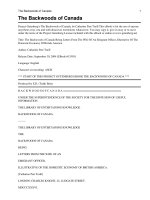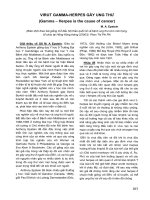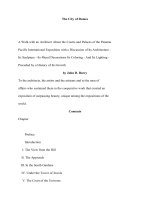The Hour of Battle potx
Bạn đang xem bản rút gọn của tài liệu. Xem và tải ngay bản đầy đủ của tài liệu tại đây (1.71 MB, 13 trang )
The Hour of Battle
Sheckley, Robert
Published: 1953
Categorie(s): Fiction, Science Fiction, Short Stories
Source: />1
About Sheckley:
Robert Sheckley (July 16, 1928 – December 9, 2005) was an American
author. First published in the science fiction magazines of the 1950s, his
numerous quick-witted stories and novels were famously unpredictable,
absurdist and broadly comical. Sheckley was given the Author Emeritus
honor by the Science Fiction and Fantasy Writers of America in 2001.
There are those who were shocked he was not given the Grand Master
Award instead. Commented one scholar, "Kingsley Amis' critical over-
view of Science Fiction named Sheckley as our field's brightest light. But
Sheckley was a humorist, and nowadays this is how our Mark Twains
are treated." Source: Wikipedia
Also available on Feedbooks for Sheckley:
• The Status Civilization (1960)
• Bad Medicine (1956)
• Reborn Again (2005)
• Cost of Living (1952)
• Warrior Race (1952)
• Diplomatic Immunity (1953)
• Beside Still Waters (1953)
• Warm (1953)
• Forever (1959)
• The Leech (1952)
Copyright: Please read the legal notice included in this e-book and/or
check the copyright status in your country.
Note: This book is brought to you by Feedbooks
Strictly for personal use, do not use this file for commercial purposes.
2
Transcriber's Note:
This etext was produced from Space Science FictionSeptember 1953. Ex-
tensive research did not uncover any evidence that the U.S. copyright on
this publication was renewed. Minor spelling and typographical errors
have been corrected without note.
3
"That hand didn't move, did it?" Edwardson asked, standing at the port,
looking at the stars.
"No," Morse said. He had been staring fixedly at the Attison Detector
for over an hour. Now he blinked three times rapidly, and looked again.
"Not a millimeter."
"I don't think it moved either," Cassel added, from behind the gunfire
panel. And that was that. The slender black hand of the indicator rested
unwaveringly on zero. The ship's guns were ready, their black mouths
open to the stars. A steady hum filled the room. It came from the Attison
Detector, and the sound was reassuring. It reinforced the fact that the
Detector was attached to all the other Detectors, forming a gigantic net-
work around Earth.
"Why in hell don't they come?" Edwardson asked, still looking at the
stars. "Why don't they hit?"
"Aah, shut up," Morse said. He had a tired, glum look. High on his
right temple was an old radiation burn, a sunburst of pink scar tissue.
From a distance it looked like a decoration.
"I just wish they'd come," Edwardson said. He returned from the port
to his chair, bending to clear the low metal ceiling. "Don't you wish
they'd come?" Edwardson had the narrow, timid face of a mouse; but a
highly intelligent mouse. One that cats did well to avoid.
"Don't you?" he repeated.
The other men didn't answer. They had settled back to their dreams,
staring hypnotically at the Detector face.
"They've had enough time," Edwardson said, half to himself.
Cassel yawned and licked his lips. "Anyone want to play some gin?"
he asked, stroking his beard. The beard was a memento of his under-
graduate days. Cassel maintained he could store almost fifteen minutes
worth of oxygen in its follicles. He had never stepped into space un-
helmeted to prove it.
Morse looked away, and Edwardson automatically watched the indic-
ator. This routine had been drilled into them, branded into their subcon-
scious. They would as soon have cut their throats as leave the indicator
unguarded.
"Do you think they'll come soon?" Edwardson asked, his brown
rodent's eyes on the indicator. The men didn't answer him. After two
months together in space their conversational powers were exhausted.
They weren't interested in Cassel's undergraduate days, or in Morse's
conquests.
4
They were bored to death even with their own thoughts and dreams,
bored with the attack they expected momentarily.
"Just one thing I'd like to know," Edwardson said, slipping with ease
into an old conversational gambit. "How far can they do it?"
They had talked for weeks about the enemy's telepathic range, but
they always returned to it.
As professional soldiers, they couldn't help but speculate on the en-
emy and his weapons. It was their shop talk.
"Well," Morse said wearily, "Our Detector network covers the system
out beyond Mars' orbit."
"Where we sit," Cassel said, watching the indicators now that the oth-
ers were talking.
"They might not even know we have a detection unit working," Morse
said, as he had said a thousand times.
"Oh, stop," Edwardson said, his thin face twisted in scorn. "They're
telepathic. They must have read every bit of stuff in Everset's mind."
"Everset didn't know we had a detection unit," Morse said, his eyes re-
turning to the dial. "He was captured before we had it."
"Look," Edwardson said, "They ask him, 'Boy, what would you do if
you knew a telepathic race was coming to take over Earth? How would
you guard the planet?'"
"Idle speculation," Cassel said. "Maybe Everset didn't think of this."
"He thinks like a man, doesn't he? Everyone agreed on this defense.
Everset would, too."
"Syllogistic," Cassel murmured. "Very shaky."
"I sure wish he hadn't been captured," Edwardson said.
"It could have been worse," Morse put in, his face sadder than ever.
"What if they'd captured both of them?"
"I wish they'd come," Edwardson said.
Richard Everset and C. R. Jones had gone on the first interstellar flight.
They had found an inhabited planet in the region of Vega. The rest was
standard procedure.
A flip of the coin had decided it. Everset went down in the scouter,
maintaining radio contact with Jones, in the ship.
The recording of that contact was preserved for all Earth to hear.
"Just met the natives," Everset said. "Funny-looking bunch. Give you
the physical description later."
"Are they trying to talk to you?" Jones asked, guiding the ship in a
slow spiral over the planet.
5
"No. Hold it. Well I'm damned! They're telepathic! How do you like
that?"
"Great," Jones said. "Go on."
"Hold it. Say, Jonesy, I don't know as I like these boys. They haven't
got nice minds. Brother!"
"What is it?" Jones asked, lifting the ship a little higher.
"Minds! These bastards are power-crazy. Seems they've hit all the sys-
tems around here, looking for someone to—"
"Yeh?"
"I've got that a bit wrong," Everset said pleasantly. "They are not so
bad."
Jones had a quick mind, a suspicious nature and good reflexes. He set
the accelerator for all the G's he could take, lay down on the floor and
said, "Tell me more."
"Come on down," Everset said, in violation of every law of spaceflight.
"These guys are all right. As a matter of fact, they're the most
marvelous—"
That was where the recording ended, because Jones was pinned to the
floor by twenty G's acceleration as he boosted the ship to the level
needed for the C-jump.
He broke three ribs getting home, but he got there.
A telepathic species was on the march. What was Earth going to do
about it?
A lot of speculation necessarily clothed the bare bones of Jones' in-
formation. Evidently the species could take over a mind with ease. With
Everset, it seemed that they had insinuated their thoughts into his, delic-
ately altering his previous convictions. They had possessed him with re-
markable ease.
How about Jones? Why hadn't they taken him? Was distance a factor?
Or hadn't they been prepared for the suddenness of his departure?
One thing was certain. Everything Everset knew, the enemy knew.
That meant they knew where Earth was, and how defenseless the planet
was to their form of attack.
It could be expected that they were on their way.
Something was needed to nullify their tremendous advantage. But
what sort of something? What armor is there against thought? How do
you dodge a wavelength?
Pouch-eyed scientists gravely consulted their periodic tables.
6
And how do you know when a man has been possessed? Although the
enemy was clumsy with Everset, would they continue to be clumsy?
Wouldn't they learn?
Psychologists tore their hair and bewailed the absence of an absolute
scale for humanity.
Of course, something had to be done at once. The answer, from a tech-
nological planet, was a technological one. Build a space fleet and equip it
with some sort of a detection-fire network.
This was done in record time. The Attison Detector was developed, a
cross between radar and the electroencephalograph. Any alteration from
the typical human brain wave pattern of the occupants of a Detector-
equipped ship would boost the indicator around the dial. Even a bad
dream or a case of indigestion would jar it.
It seemed probable that any attempt to take over a human mind would
disturb something. There had to be a point of interaction, somewhere.
That was what the Attison Detector was supposed to detect. Maybe it
would.
The spaceships, three men to a ship, dotted space between Earth and
Mars, forming a gigantic sphere with Earth in the center.
Tens of thousands of men crouched behind gunfire panels, watching
the dials on the Attison Detector.
The unmoving dials.
"Do you think I could fire a couple of bursts?" Edwardson asked, his
fingers on the gunfire button. "Just to limber the guns?"
"Those guns don't need limbering," Cassel said, stroking his beard.
"Besides, you'd throw the whole fleet into a panic."
"Cassel," Morse said, very quietly. "Get your hand off your beard."
"Why should I?" Cassel asked.
"Because," Morse answered, almost in a whisper, "I am about to ram it
right down your fat throat."
Cassel grinned and tightened his fists. "Pleasure," he said. "I'm tired of
looking at that scar of yours." He stood up.
"Cut it," Edwardson said wearily. "Watch the birdie."
"No reason to, really," Morse said, leaning back. "There's an alarm bell
attached." But he looked at the dial.
"What if the bell doesn't work?" Edwardson asked. "What if the dial is
jammed? How would you like something cold slithering into your
mind?"
7
"The dial'll work," Cassel said. His eyes shifted from Edwardson's face
to the motionless indicator.
"I think I'll sack in," Edwardson said.
"Stick around," Cassel said. "Play you some gin."
"All right." Edwardson found and shuffled the greasy cards, while
Morse took a turn glaring at the dial.
"I sure wish they'd come," he said.
"Cut," Edwardson said, handing the pack to Cassel.
"I wonder what our friends look like," Morse said, watching the dial.
"Probably remarkably like us," Edwardson said, dealing the cards.
Cassel picked them up one by one, slowly, as if he hoped something in-
teresting would be under them.
"They should have given us another man," Cassel said. "We could play
bridge."
"I don't play bridge," Edwardson said.
"You could learn."
"Why didn't we send a task force?" Morse asked. "Why didn't we
bomb their planet?"
"Don't be dumb," Edwardson said. "We'd lose any ship we sent. Prob-
ably get them back at us, possessed and firing."
"Knock with nine," Cassel said.
"I don't give a good damn if you knock with a thousand," Edwardson
said gaily. "How much do I owe you now?"
"Three million five hundred and eight thousand and ten. Dollars."
"I sure wish they'd come," Morse said.
"Want me to write a check?"
"Take your time. Take until next week."
"Someone should reason with the bastards," Morse said, looking out
the port. Cassel immediately looked at the dial.
"I just thought of something," Edwardson said.
"Yeh?"
"I bet it feels horrible to have your mind grabbed," Edwardson said. "I
bet it's awful."
"You'll know when it happens," Cassel said.
"Did Everset?"
"Probably. He just couldn't do anything about it."
"My mind feels fine," Cassel said. "But the first one of you guys starts
acting queer—watch out."
They all laughed.
8
"Well," Edwardson said, "I'd sure like a chance to reason with them.
This is stupid."
"Why not?" Cassel asked.
"You mean go out and meet them?"
"Sure," Cassel said. "We're doing no good sitting here."
"I should think we could do something," Edwardson said slowly.
"After all, they're not invincible. They're reasoning beings."
Morse punched a course on the ship's tape, then looked up.
"You think we should contact the command? Tell them what we're
doing?"
"No!" Cassel said, and Edwardson nodded in agreement. "Red tape.
We'll just go out and see what we can do. If they won't talk, we'll blast
'em out of space."
"Look!"
Out of the port they could see the red flare of a reaction engine; the
next ship in their sector, speeding forward.
"They must have got the same idea," Edwardson said.
"Let's get there first," Cassel said. Morse shoved the accelerator in and
they were thrown back in their seats.
"That dial hasn't moved yet, has it?" Edwardson asked, over the clam-
or of the Detector alarm bell.
"Not a move out of it," Cassel said, looking at the dial with its indicator
slammed all the way over to the highest notch.
9
Loved this book ?
Similar users also downloaded
Arthur Leo Zagat
When the Sleepers Woke
Only two small groups of people—enemies—survive the vast des-
olation of the Final War.
Robert Sheckley
Beside Still Waters
When people talk about getting away from it all, they are usually
thinking about our great open spaces out west. But to science fic-
tion writers, that would be practically in the heart of Times
Square. When a man of the future wants solitude he picks a slab of
rock floating in space four light years east of Andromeda. Here is
a gentle little story about a man who sought the solitude of such a
location. And who did he take along for company? None other
than Charles the Robot.
Robert Sheckley
Forever
Of all the irksome, frustrating, maddening discoveries—was there
no way of keeping it discovered?
Robert Sheckley
The Leech
A visitor should be fed, but this one could eat you out of house
and home literally!
Robert Sheckley
Warm
It was a joyous journey Anders set out on to reach his goal but
look where he wound up!
Robert Sheckley
Reborn Again
Robert Sheckley
Warrior Race
Destroying the spirit of the enemy is the goal of war and the aliens
had the best way!
Robert Sheckley
Bad Medicine
Robert Sheckley
The Status Civilization
10
Will Barrent had no memory of his crime . . . but he found himself
shipped across space to a brutal prison-planet. On Omega, his
only chance to advance himself and stay alive is to commit an
endless series of violent crimes. The average inmate's life expect-
ancy from time of arrival is three years. Can Barrett survive, es-
cape, and return to Earth to clear his name?
Robert Sheckley
Cost of Living
If easy payment plans were to be really efficient, patrons' lifetimes
had to be extended!
11
www.feedbooks.com
Food for the mind
12









